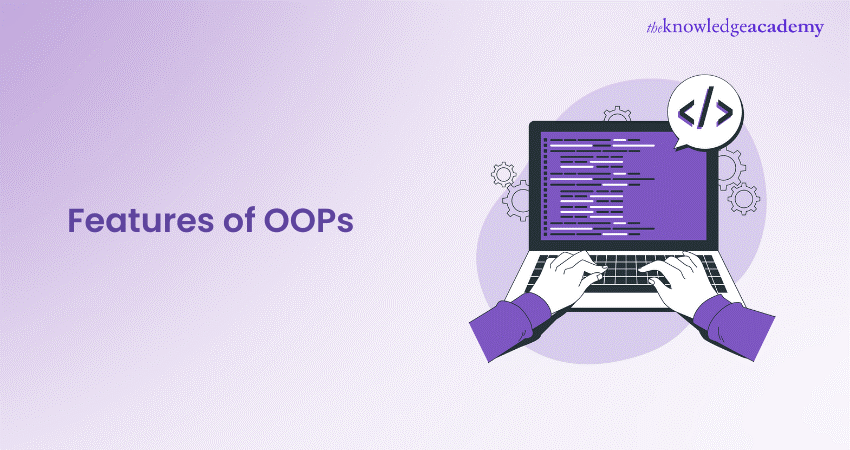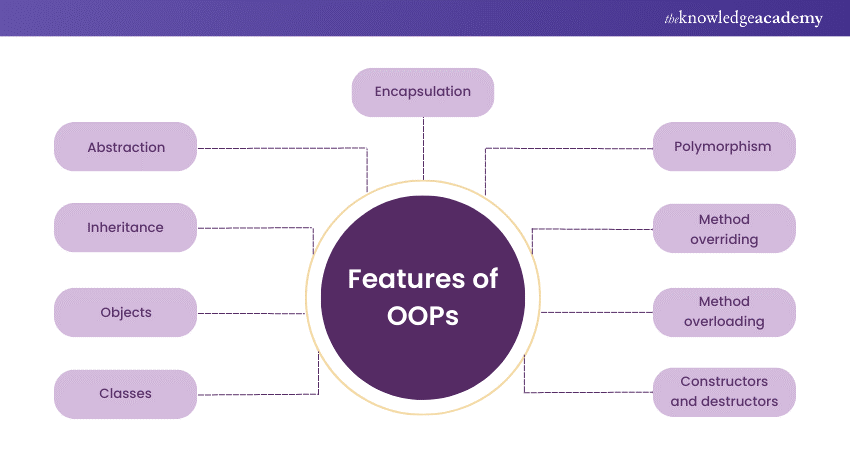We may not have the course you’re looking for. If you enquire or give us a call on +34 932716793 and speak to our training experts, we may still be able to help with your training requirements.
Training Outcomes Within Your Budget!
We ensure quality, budget-alignment, and timely delivery by our expert instructors.

Are you bored of constantly coding on Procedural Languages? Does organising your code around functions and data bore you and kill your creativity? Perhaps you want to dedicate more time ideating and coming up with innovative solutions rather than focusing on procedures and routines. Then Object-Oriented Programming (OOPs) is the antidote you need. Maybe this comprehensive list of Features of OOPs will convince you of the same.
This blog will delve into the What is OOPs and the Features of OOPs, elaborating on each of them, from Objects and classes to constructors and destructors.
Table of Contents
1) What is OOPS?
2) Features of OOPs
a) Classes
b) Objects
c) Inheritance
d) Abstraction
e) Encapsulation
f) Polymorphism
g) Method overriding
h) Method overloading
i) Constructors and destructors
3) Conclusion
What is OOPs?
Object-Oriented Programming (OOPs) is a paradigm that organises software design around real-world entities and their interactions. At its core are Objects, instances of classes representing distinct entities with defined properties and behaviours. OOPs principles include encapsulation, bundling data and methods within an Object; abstraction, simplifying complex systems by focusing on essential features; inheritance, enabling new classes to inherit properties from existing ones; and polymorphism, allowing Objects of different types to be treated uniformly.
Classes serve as blueprints for Objects, defining their structure and functionality. Methods and functions within classes operate on Object data. OOPs facilitates modularity, code reusability, and clearer system design, making it a widely adopted and effective paradigm in modern software development.

Features of OOPs
Here are some of the prominent features of Object-Oriented Programming that assist coders and developers to a great extent:

1) Classes
In Object-Oriented Programming, classes are fundamental building blocks, acting as blueprints for creating Objects. A class defines the structure and behaviour that Objects of that class will exhibit. It encapsulates data attributes and methods, providing a modular and organised approach to software design.
Classes enable the modelling of real-world entities, allowing developers to represent and manipulate complex systems with clarity and efficiency. Through classes, code becomes more maintainable, reusable, and scalable, fostering a systematic approach to creating software systems in a way that mirrors the relationships and interactions found in the real world.
2) Objects
Objects in OOPs are fundamental entities representing real-world entities with specific attributes and behaviours. Instances of classes and Objects encapsulate data and methods, promoting modularity and efficient code organisation. Each Object interacts with others through well-defined interfaces, fostering a structured approach to software design.
Objects mirror tangible or conceptual entities, allowing developers to model and manipulate complex systems easily. This encapsulation of data and functionality within Objects enhances code reusability, adaptability, and maintainability, making OOPs a powerful paradigm in modern software development.
3) Inheritance
Inheritance is a fundamental concept in OOPs where a new class (subclass or derived class) inherits properties and behaviours from an existing class (superclass or base class). This mechanism fosters code reusability, allowing the derived class to leverage the attributes and methods of the base class.
It establishes a hierarchical relationship, promoting a structured and organised codebase. Inheritance enables the creation of specialised classes that build upon the functionality of more generalised ones, enhancing modularity and easing maintenance. This principle is central to designing scalable and extensible software systems systematically and efficiently.
Enhance your coding skills and unleash the potential of web development with our Ruby Programming Course. Join today!
4) Abstraction
Abstraction in OOPs involves simplifying complex systems by modelling classes based on real-world entities. It focuses on essential features while concealing unnecessary details, creating a clear and concise design. Abstraction allows developers to represent an Object's core attributes and behaviours without getting into its implementation's intricacies.
This principle enhances code readability and facilitates a more efficient and intuitive understanding of a program's structure. By emphasising what an Object does rather than how it achieves it, abstraction promotes a streamlined and manageable approach to software design and development.
5) Encapsulation
Encapsulation in OOP is a fundamental feature that involves bundling data (attributes) and methods (functions) that operate on that data into a single unit—an Object. This shields the internal workings of an Object from the outside world, promoting data integrity and security.
Encapsulation also emphasises access control, allowing selective exposure of an Object's internal details through well-defined interfaces. By encapsulating data within Objects, OOPs enhances modularity and code organisation, making managing and maintaining large-scale software systems easier while fostering the principle of information hiding for robust and secure program design.
6) Polymorphism
Polymorphism, a key feature of OOPs, allows Objects of different classes to be treated as Objects of a standard base class. This promotes flexibility in code, enabling a single interface to represent various types of Objects interchangeably. There are two types of polymorphism: compile-time polymorphism (method overloading) and runtime polymorphism (method overriding).
Method overloading involves defining multiple methods with the same name but different parameters, enhancing code readability. Method overriding occurs when a subclass provides a specific implementation for a method in its superclass, facilitating the customisation of behaviour. Polymorphism simplifies code design, making it adaptable to different scenarios.
Transform data with R expertise. Join our R Programming Course to elevate your analytical skills and career potential.
7) Method overriding
Method overriding is a critical feature in Object-Oriented Programming that allows a subclass to provide a specific implementation for a method already defined in its superclass. This enables customisation of behaviour in the subclass, promoting flexibility and adaptability. The overridden method in the subclass has the same signature as the one in the superclass, establishing a polymorphic relationship.
Method Overriding enhances code extensibility, allowing developers to tailor the functionality of inherited methods to suit the specific requirements of individual subclasses. This dynamic behaviour during runtime contributes to the power and versatility of OOPs.
8) Method overloading
Method overloading in OOPs allows a class to have multiple methods with the same name but different parameters. This enhances code flexibility, enabling developers to create methods that perform similar tasks but accommodate variations in input. Overloaded methods provide a cleaner, more readable codebase, as developers can invoke the same method name with different argument sets.
This feature streamlines the development process, making it easier to work with diverse data types or handle various scenarios without cluttering the code with multiple method names. Method overloading is a critical element in OOPs, contributing to code versatility and maintainability.
9) Constructors and destructors
Constructors and Destructors are integral features of OOPs that manage Object lifecycle. Constructors initialise Objects, setting initial values for attributes when they are created. They ensure that Objects start with valid and consistent states.
Destructors, on the other hand, are responsible for cleaning up resources when an Object is no longer in use. They handle tasks such as releasing memory or closing files. Constructors and Destructors contribute to effective memory management and resource allocation in OOPs, ensuring that Objects are appropriately initialised and resources are reclaimed when they go out of scope.
Unlock the power of OOPs languages with our comprehensive Object-Oriented Programming (OOPs) Course. Sign up now!
Conclusion
Hopefully, this blog helped you understand the Features of OOPs, ranging from Objects and classes to method overriding and method overloading. These features form the basis of any Object-Oriented Programming Language and will help you gain mastery over them.
Frequently Asked Questions

OOP is a programming paradigm that organises code into Objects, each encapsulating data and behaviour. It promotes modularity and reusability by structuring software around real-world entities.

OOP enhances code flexibility, scalability, and maintainability. It simplifies complex systems, fosters code organisation, and supports collaborative development, making it crucial for building robust and efficient software.

OOP principles include encapsulation, inheritance, and polymorphism. Encapsulation protects data integrity, inheritance facilitates code reuse, and polymorphism allows Objects to take multiple forms, fostering code flexibility and extensibility.

The Knowledge Academy takes global learning to new heights, offering over 30,000 online courses across 490+ locations in 220 countries. This expansive reach ensures accessibility and convenience for learners worldwide.
Alongside our diverse Online Course Catalogue, encompassing 17 major categories, we go the extra mile by providing a plethora of free educational Online Resources like News updates, blogs, videos, webinars, and interview questions. Tailoring learning experiences further, professionals can maximise value with customisable Course Bundles of TKA.
The Knowledge Academy’s Knowledge Pass, a prepaid voucher, adds another layer of flexibility, allowing course bookings over a 12-month period. Join us on a journey where education knows no bounds.

The Knowledge Academy offers various Object Oriented Programming (OOPs) Course, including Python Course, PHP Course, Swift Training etc. These courses cater to different skill levels, providing comprehensive insights into Introduction to OOPs.
Our Programming & Devops blogs covers a range of topics related to Object Oriented Programming (OOPs), offering valuable resources, best practices, and industry insights. Whether you are a beginner or looking to advance your Project Management skills, The Knowledge Academy's diverse courses and informative blogs have you covered.

The Knowledge Academy’s FlexiPass is a pre-paid training voucher that is built specifically for clients and their dynamic needs. It provides access to a wide range of courses, at a pre-determined price, with robust safety measures. FlexiPass gives clients the added benefit of upskilling on a budget that best fits them.
Upcoming Programming & DevOps Resources Batches & Dates
Date
 Object Oriented Programming (OOPs) Course
Object Oriented Programming (OOPs) Course
Thu 1st Jan 1970







 Top Rated Course
Top Rated Course


 If you wish to make any changes to your course, please
If you wish to make any changes to your course, please


